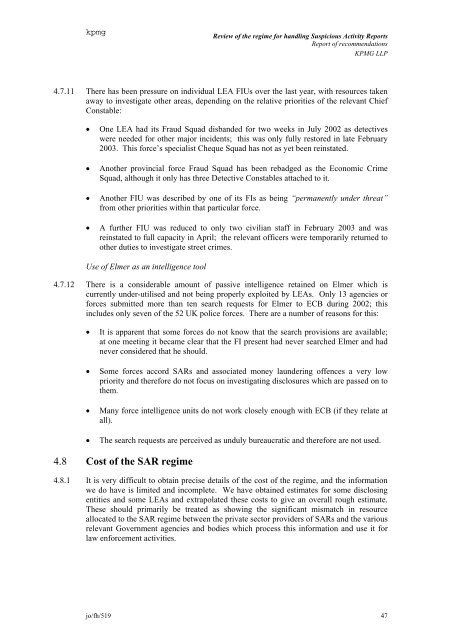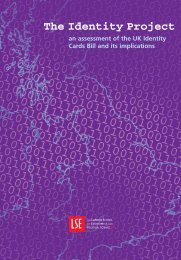Money Laundering: Review of the Reporting ... - Dematerialised ID
Money Laundering: Review of the Reporting ... - Dematerialised ID
Money Laundering: Review of the Reporting ... - Dematerialised ID
You also want an ePaper? Increase the reach of your titles
YUMPU automatically turns print PDFs into web optimized ePapers that Google loves.
kpmg<br />
<strong>Review</strong> <strong>of</strong> <strong>the</strong> regime for handling Suspicious Activity Reports<br />
Report <strong>of</strong> recommendations<br />
KPMG LLP<br />
4.7.11 There has been pressure on individual LEA FIUs over <strong>the</strong> last year, with resources taken<br />
away to investigate o<strong>the</strong>r areas, depending on <strong>the</strong> relative priorities <strong>of</strong> <strong>the</strong> relevant Chief<br />
Constable:<br />
• One LEA had its Fraud Squad disbanded for two weeks in July 2002 as detectives<br />
were needed for o<strong>the</strong>r major incidents; this was only fully restored in late February<br />
2003. This force’s specialist Cheque Squad has not as yet been reinstated.<br />
• Ano<strong>the</strong>r provincial force Fraud Squad has been rebadged as <strong>the</strong> Economic Crime<br />
Squad, although it only has three Detective Constables attached to it.<br />
• Ano<strong>the</strong>r FIU was described by one <strong>of</strong> its FIs as being “permanently under threat”<br />
from o<strong>the</strong>r priorities within that particular force.<br />
• A fur<strong>the</strong>r FIU was reduced to only two civilian staff in February 2003 and was<br />
reinstated to full capacity in April; <strong>the</strong> relevant <strong>of</strong>ficers were temporarily returned to<br />
o<strong>the</strong>r duties to investigate street crimes.<br />
Use <strong>of</strong> Elmer as an intelligence tool<br />
4.7.12 There is a considerable amount <strong>of</strong> passive intelligence retained on Elmer which is<br />
currently under-utilised and not being properly exploited by LEAs. Only 13 agencies or<br />
forces submitted more than ten search requests for Elmer to ECB during 2002; this<br />
includes only seven <strong>of</strong> <strong>the</strong> 52 UK police forces. There are a number <strong>of</strong> reasons for this:<br />
• It is apparent that some forces do not know that <strong>the</strong> search provisions are available;<br />
at one meeting it became clear that <strong>the</strong> FI present had never searched Elmer and had<br />
never considered that he should.<br />
• Some forces accord SARs and associated money laundering <strong>of</strong>fences a very low<br />
priority and <strong>the</strong>refore do not focus on investigating disclosures which are passed on to<br />
<strong>the</strong>m.<br />
• Many force intelligence units do not work closely enough with ECB (if <strong>the</strong>y relate at<br />
all).<br />
• The search requests are perceived as unduly bureaucratic and <strong>the</strong>refore are not used.<br />
4.8 Cost <strong>of</strong> <strong>the</strong> SAR regime<br />
4.8.1 It is very difficult to obtain precise details <strong>of</strong> <strong>the</strong> cost <strong>of</strong> <strong>the</strong> regime, and <strong>the</strong> information<br />
we do have is limited and incomplete. We have obtained estimates for some disclosing<br />
entities and some LEAs and extrapolated <strong>the</strong>se costs to give an overall rough estimate.<br />
These should primarily be treated as showing <strong>the</strong> significant mismatch in resource<br />
allocated to <strong>the</strong> SAR regime between <strong>the</strong> private sector providers <strong>of</strong> SARs and <strong>the</strong> various<br />
relevant Government agencies and bodies which process this information and use it for<br />
law enforcement activities.<br />
jo/fh/519 47









